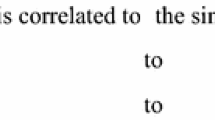Abstract
Modal Dimensionalism is a metaphysical theory about possible worlds that is naturally suggested by the often-noted parallelism between modal logic and tense logic. It says that the universe spreads out not only in spatiotemporal dimensions but also in a modal dimension. It regards worlds as nothing more or less than indices in the modal dimension in the way analogous to the way in which Temporal Dimensionalism regards temporal points and intervals as indices in the temporal dimension. Despite its naturalness and intuitive appeal. Modal Dimensionalism has been largely ignored while the debates between David Lewis and his critics have dominated the discourse on the nature of possible worlds. It is high time that we took Modal Dimensionalism seriously as a viable alternative.
Similar content being viewed by others
References
Adams, R. 1974: ‘Theories of Actuality’,Nous 8, 211–31.
Camap, R. 1947:Meaning and Necessity, Chicago: University of Chicago Press.
Cresswell, M. 1972: ‘The World is Everything That is the Case’,Australasian Journal of Philosophy 50, 1–13.
Forrest, P. 1986: ‘Ways Worlds Could Be’,Australasian Journal of Philosophy 64, 15–24.
Grim, P. 1991:The Incomplete Universe, Cambridge, MA: A Bradford Book, MIT Press.
Kripke, S. 1980:Naming and Necessity, Cambridge, MA: Harvard University Press.
Lewis, D. 1973:Counterfactuals, Cambridge, MA: Harvard University Press.
Lewis, D. 1983:Philosophical Papers I, New York and Oxford: Oxford University Press.
Lewis, D. 1986:On the Plurality of Worlds, Oxford and New York: Basil Blackwell.
Lycan, W. 1979: ‘The Trouble with Possible Worlds’,The Possible and the Actual: Readings in the Metaphysics of Modality, Loux, M. (ed.), Ithaca and London: Cornell University Press, 274–316.
Plantinga, A. 1974:The Nature of Necessity, Oxford: Clarendon Press.
Salmon, N. 1996: ‘Trans-World Identification and Stipulation’,Philosophical Studies 84, 203–23.
Shalkowski, S. 1994: ‘The Ontological Ground for the Alcthic Modality’,Philosophical Review 103, 669–88.
Stalnaker, R. 1976: ‘Possible Worlds’,Nous 10, 65–75.
Quine, W. 1976: ‘Worlds Away’,Journal of Philosophy 73, 859–63.
Zalta, E. 1987: ‘On the Structural Similarities Between Worlds and Times’,Philosophical Studies 51, 213–39.
Author information
Authors and Affiliations
Rights and permissions
About this article
Cite this article
Yagisawa, T. Primitive worlds. Acta Analytica 17, 19 (2002). https://doi.org/10.1007/BF03177505
Received:
DOI: https://doi.org/10.1007/BF03177505




